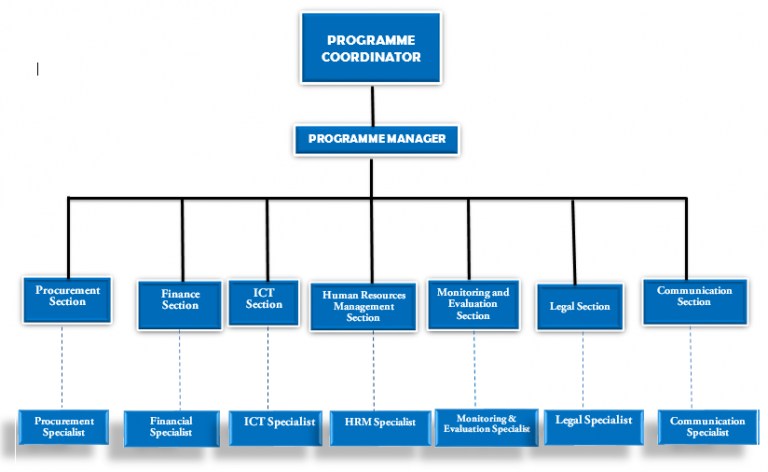Organogram

- Monitoring & Evaluation Section
-
Monitoring and Evaluation (M&E) Section is responsible for coordination of the M&E activities which includes monitoring and reporting on the progress and achievements of the PFMR Strategy. Monitoring of results areas in the PFMR Strategy is carried out by the Result Teams in relation to the PFMR Strategy results framework and the Annual Work Plans. The result teams from the Ministries, Counties, Departments and Agencies (MCDA’s) shall ensure that reports and findings are submitted to the Secretariat.
Monitoring and Evaluation Basis
The Secretariat shall ensure that Monitoring and Evaluation is guided by the following principles:
Regular and continuous dialogue with PFM stakeholder institutions; The established and agreed results framework of the PFMR Strategy; Narrative reporting from the PFM stakeholder institutions ( quality assured by the Secretariat); Financial and audit reports from the PFM stakeholder institutions (quality assured by the Secretariat); Activities are regularly and systematically monitored and evaluated; and Activities are built into the design of project activity.
- ICT Section
-
Information Communication Technology Section advises the Secretariat on the best IT practices in order to realize reforms in service delivery. This is achieved through developing technical specifications for equipment as per the most current technology, automating manual processes, integrating PFM systems to ensure seamless communication of the systems, and ensuring adherence to international standards of systems security.
- Procurement Section
-
The Secretariat and the implementing MDAs shall ensure that procurement for Programme Goods, Services, Works and Consultancies are carried out in strict conformity with the Public Procurement and Asset Disposal Act 2015 as well as related regulations and guidelines that may be issued from time to time by the CS/NT&P. The guiding general principles in Procurement are:
Competition, Economy and Efficiency: Implementing MDAs must ensure that economy and efficiency prevail in the procurement of goods, works, and services. Eligibility to Compete: Implementing MDAs must provide eligible bidders a fair opportunity to compete in providing goods, works and services. Exceptions to this may be: As a matter of law or official regulation; and If the potential bidder is restricted Domestic Preference: Implementing MDAs must encourage the development of domestic industries by engaging, as much as possible suppliers of goods produced in Kenya. Transparency: Implementing MDAs must provide for transparency in the procurement process.
- Finance Section
-
Finance section are responsible for accounting and reporting arrangements under the Programme by using accounting policies, the accounting systems, the chart of accounts, the accounting records, the safekeeping and filing of accounting documents and financial reports.
Financial statements may be prepared in accordance with IPSAS Cash and as per the format prescribed by the PSASB. The cash basis of accounting Receivables that include imprests and salary advances; and Payables that include deposits and retentions.
They are also responsible for developing budget for the Secretariat through comparable accounting basis (cash basis), the same accounts classification basis (except for accounts receivable – outstanding imprest and clearance accounts and accounts payable – deposits, which are accounted for on), and for the same period as the financial statements.
- Communication Section
-
This section is responsible for communicating with the public and provision of guidance on complaints and compliments handling for the Programme. They are guided by PFMR communication strategy and any other approved communication policies and procedures adapted by the Secretariat.
The Communication section aims are achieving their mandate through;
Establishing and entrenching a culture of internal communication and information sharing for enhanced staff engagement and delivery. The effectiveness of an organisation’s external communications is directly dependent on its internal systems, culture and communication practices. Increasing awareness on PFM reforms among strategic stakeholders for enhanced understanding and support for the Programme. Facilitating continuous learning and information sharing among Implementing MDAs for improved service delivery. Strengthen engagement with donors for enhanced focus towards achievement of common goals and results of the programme.
- Legal Section
-
This section ensure a consistent and harmonized PFM Legal and Institutional Framework and enhance compliance of MDAs and counties with its implementation. Key legislations, namely the Constitution of Kenya 2010 and PFM Act 2012, were already in place at the time of drafting and adoption of the current PFM Strategy. They provide the framework for enacting subsidiary legislations many of which were identified under the Fifth Schedule of the Constitution. Relevant legislations in the schedule cover public participation, revenue funds for counties, contingencies fund, loans guarantees, financial control, accounts and audit of public entities, and procurement of goods and services.
